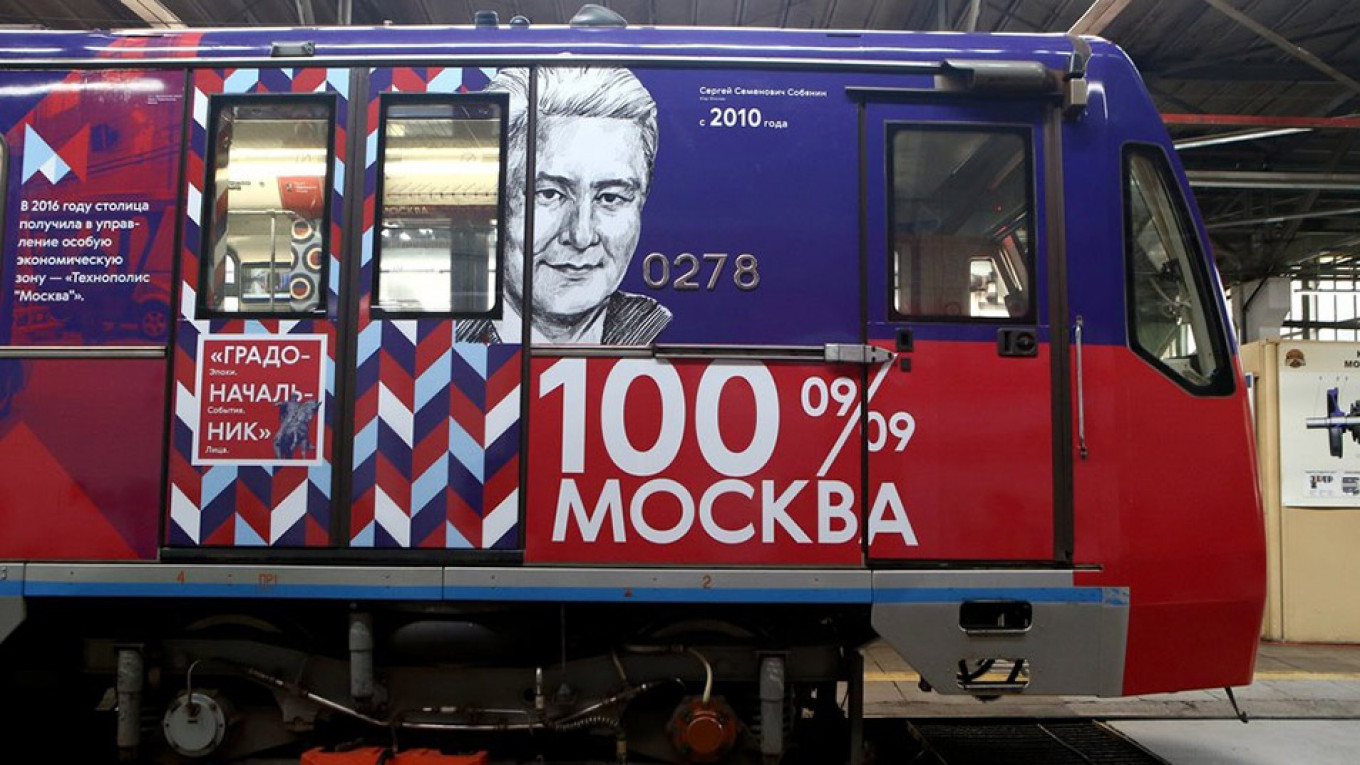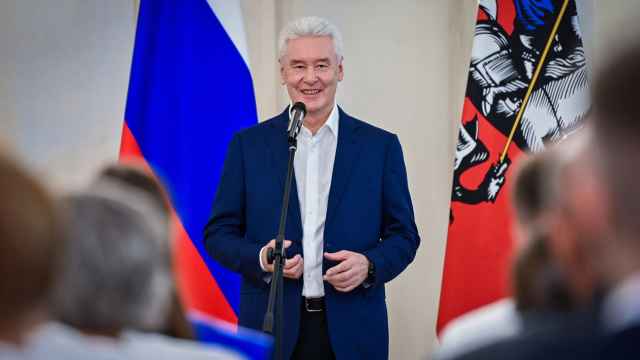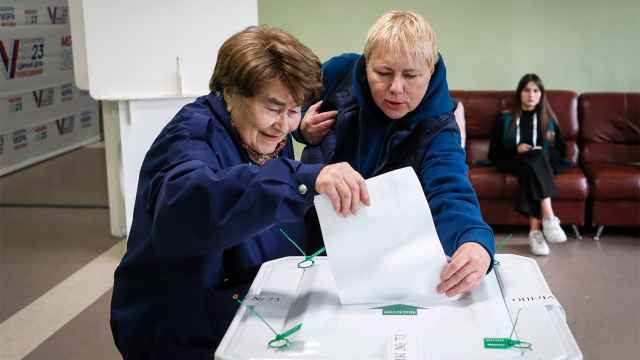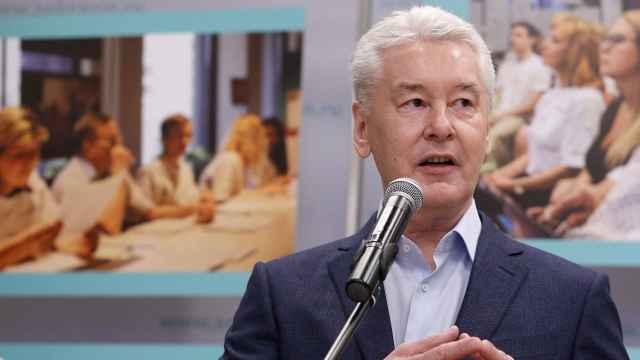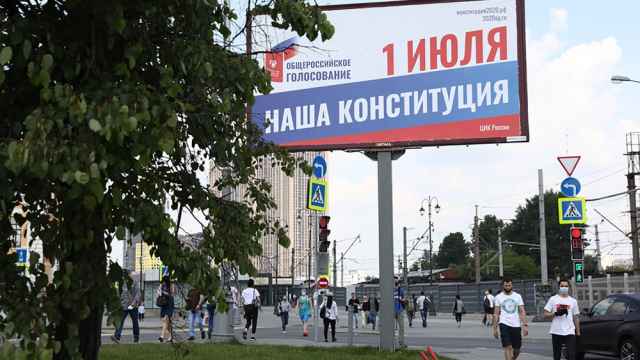Sunday’s mayoral elections in Moscow marked a turning point. Until this weekend, the capital had a democratically elected mayor: Sergei Sobyanin was the victor of an unexpectedly fierce electoral battle back in September 2013, and he has presided over the capital since.
Although Sobyanin was again chosen to be the capital mayor, his victory this time around was not the result of an election in the true sense of the word.
Rather, it was the product of a marketing campaign.
The multifunctional Sobyanin brand was promoted like the latest washing machine, or in this case, the latest, most cutting-edge construction company. After all, the almost continuous repaving of Moscow’s streets is the signature policy of the man in charge of the Russian capital.
This year, the Kremlin decided they weren’t going to allow candidates from the liberal opposition (such as former Duma deputy Dmitry Gudkov) to take part in the vote. These contenders failed to collect the required number of signatures from local lawmakers to be able to run.
The authorities likely took this decision to avoid repeating the mistakes of their 2013 campaign, when opposition leader Alexei Navalny took 27.24 percent of the vote, almost forcing Sobyanin, who won with 51.37 percent, into a runoff.
Sobyanin’s haul on Sunday was not too far off Vladimir Putin’s share of the vote in presidential elections earlier this year in March — 70 percent compared with Putin’s 71 percent.
But despite an unprecedented campaign to boost turnout, the overall figure of 30 percent will have been disappointing for the authorities. In 2013, the margin was slightly higher at 32 percent.
One reason that so few Muscovites went to the polls was likely because there was a complete lack of intrigue around the vote and no real competition from opposition candidates.
The Kremlin was confident that if they allowed anti-corruption crusader Navalny to run, he would not be able to secure more than a small percentage of the vote. But ultimately, the mayor’s office wasn’t even prepared to simulate electoral competition and risk disturbing the city’s political hibernation by allowing Navalny to run. In the end, it decided to only promote the Sobyanin brand.
City Hall’s marketing goals included transforming polling stations into mobile playgrounds (making them more attractive to families with children); handing out free concert tickets to voters; and opening a concert venue in the popular new Zaryadye park near the Kremlin, attended by Sobyanin and President Vladimir Putin.
All told, the day was characterized by a mixture of sophisticated marketing techniques, the suppression of the opposition and banning of any anti-government demonstrations.
The problem with this approach is that it affects voter turnout. As the municipal elections of September 2017 demonstrated, the fewer people at polling stations, the more votes for the ruling authorities, and vice versa. On Sunday, Sobyanin’s team was striving to achieve a decent turnout. But given the electorate’s loyalty to ritual ballots and giving the Kremlin the outcome it wants, this goal seemed attainable.
The dearth of real alternatives is the most obvious explanation for Sobyanin’s artificial popularity. Yet many representatives of the capital’s creative class do support him. Sobyanin’s team has created the image of a forward-looking mayor, open to urban modernization. Digitalization, gentrification, reconstruction, regeneration: all these buzzwords sound seductive to Moscow’s progressive and young population. For them, open urban spaces are sometimes more important than an open society.
Sobyanin mercilessly suppresses any signs of opposition activity. He is prepared to use any tools at his disposal to realize his personal vision of Moscow. He is ready to enter into conflict with local communities that defend parks and courtyards from sometimes barbaric reconstruction work. But in the eyes of the new urban conformists, the mayor is implementing an authoritarian modernization utopia in Moscow. And if he were to become prime minister or president, these dreamers reason, Sobyanin could realize this utopia on a nationwide scale.
Admittedly it would be in a technocratic way, but Moscow’s experience has demonstrated that the city can manage quite well without democracy.
These loyal Sobyanin supporters people don’t take into account that as Moscow mayor, Sobyanin has a vast fortune at his disposal: about 20 percent of all the country’s regional revenues. That is to say: We know who Mr. Sobyanin is with money, but we don’t know who he would be without money, as prime minister, for example.
A promotion like this is conceivable: he has demonstrated to Putin his efficiency in quelling social upset on more than one occasion, such as over plans to demolish many Khrushchev-era, five-story apartment buildings in the city. Not to mention that Sobyanin is the only pro-Putin politician to have taken on Navalny in an election — and won.
Andrei Kolesnikov is a senior associate and the chair of the Russian Domestic Politics and Political Institutions Program at the Carnegie Moscow Center. The views expressed in opinion pieces do not necessarily reflect the position of The Moscow Times.
A Message from The Moscow Times:
Dear readers,
We are facing unprecedented challenges. Russia's Prosecutor General's Office has designated The Moscow Times as an "undesirable" organization, criminalizing our work and putting our staff at risk of prosecution. This follows our earlier unjust labeling as a "foreign agent."
These actions are direct attempts to silence independent journalism in Russia. The authorities claim our work "discredits the decisions of the Russian leadership." We see things differently: we strive to provide accurate, unbiased reporting on Russia.
We, the journalists of The Moscow Times, refuse to be silenced. But to continue our work, we need your help.
Your support, no matter how small, makes a world of difference. If you can, please support us monthly starting from just $2. It's quick to set up, and every contribution makes a significant impact.
By supporting The Moscow Times, you're defending open, independent journalism in the face of repression. Thank you for standing with us.
Remind me later.



